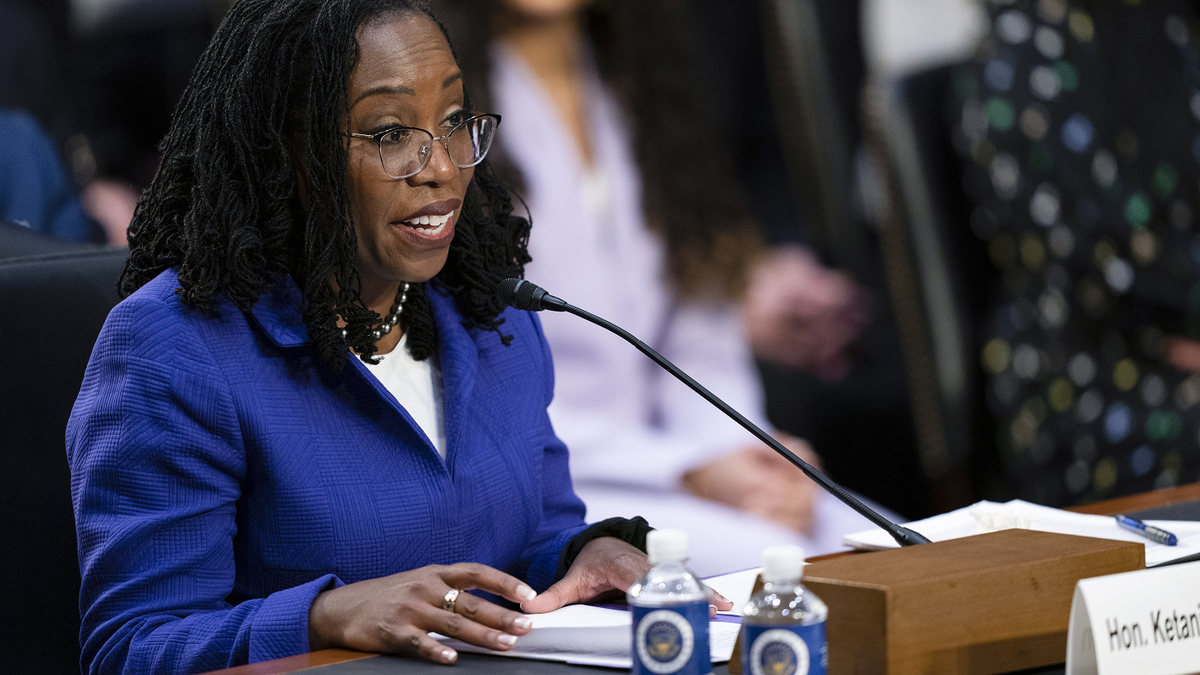Judge Jackson refuses to define the word ‘woman’
Gutfeld and guests discuss Judge Ketanji Brown Jackson refusing to answer Sen. Blackburn’s question about how to define the word ‘woman’ on ‘Gutfeld!’
Supreme Court nominee Judge Ketanji Brown Jackson's Senate confirmation hearing wrapped up Thursday after days of interrogation over her qualifications and previous rulings.
The judge managed to dodge numerous questions regarding her previous rulings as a federal judge and ducked requests for clarification of her stance on a variety of Constitutional debates.
Republicans have accused Jackson of intentionally obscuring her personal beliefs and judicial philosophy, while Democrats have criticized Republicans' questions, particularly on her record on sentencing child sex predators, as "vicious" and unrelated to the nominee's potential role on the Supreme Court.
BIDEN'S SUPREME COURT PICK KETANJI BROWN JACKSON TESTIFIES FOR SECOND DAY: LIVE UPDATES
Critical Race Theory
Sen. Ted Cruz, R-Texas, asked Jackson: "Although critical legal studies frames society as a fundamental battle between socioeconomic classes, critical race theory frames all of society as a fundamental and intractable battle between the races. It views every conflict as a racial conflict. Do you think that's an accurate way of feeling society in the world we live in?"
"Senator, I don't think so, but I've never studied critical race theory and I've never used it," Brown responded. "It doesn't come up in the work that I do as a judge."
Cruz pivoted, asking instead if Jackson could say if "critical race theory [is] taught in schools," specifically kindergarten through 12th grade. Jackson dodged the question in the same manner, answering, "I don't know. I don't think so. I believe it's an academic theory that's at the law school level."
Despite her response, Jackson serves on the board of trustees for an elite private Washington, D.C., school that promotes critical race theory.
Abortion
At one point, Sen. John Kennedy, R-La., asked Brown a fundamental question for both sides of the abortion debate: "When does life begin, in your opinion?"
"I don't know. I have a belief. I have personal, religious and otherwise beliefs that have nothing to do with the law in terms of when life begins," Jackson responded.

Sen. Marsha Blackburn, R-Tenn, during the confirmation hearing for Judge Ketanji Brown Jackson. (Bill Clark/CQ-Roll Call, Inc via Getty Images)
Second Amendment
Touching on the Second Amendment in U.S. Constitutional law, Jackson affirmed the right to bear arms as "fundamental right" outlined in the document. However, pressed further for what exactly a "fundamental right" is or how it may be defined, Jackson again wavered.
"Could you tell me how you might go about deciding what a fundamental right is under the Constitution?" asked Sen. Chuck Grassley, R-Iowa.
"Well, Senator, I don't know that I can tell you that in the abstract, in this sort of way that you may have posed the question," Jackson responded.

Supreme Court nominee Ketanji Brown Jackson speaks during her confirmation hearing before the Senate Judiciary Committee. (AP Photo/Evan Vucci)
Noncitizen voting
Sen. Lindsey Graham, R-S.C., pushed Jackson on noncitizen voting in the U.S., asking her, "Do you believe illegal immigrants should be allowed to vote, Judge Jackson?"
"Thank you, Senator. Under our laws, you have to be a citizen of the United States in order to vote," Jackson replied. Asked for clarification if her answer meant "no," Jackson continued, "It's not consistent with our laws. So the answer is no."
Graham then asked Jackson why, then, she thought voting by noncitizens was approved in cities such as New York.
The New York City Council last year approved a measure to allow the nearly 800,000 legal non-citizens in the metropolis to vote in municipal elections. The measure, which would affect green card holders and those with work authorizations, doesn’t include state or federal elections, and people in the country illegally would not be allowed to vote.
Jackson stated that she was not familiar with the issue.
Definition of "woman"
Jackson also refused to define the word "woman" on the second day of her confirmation hearings before the U.S. Senate's Judiciary Committee.
"Can you provide a definition for the word ‘woman'?" Sen. Blackburn, R-Tenn., asked.
"Can I provide a definition? No," Jackson responded. "I can't."
"You can't?" Blackburn asked.
"Not in this context. I'm not a biologist," the judge replied.
The exchange on the nature and meaning of the word "woman" was one of the most clipped and commented-on moments of the hearing, drawing criticism from conservatives. Critics asserted that the ability to understand what a female is would be fundamental for women's rights and gender issues.

Chairman of the Senate Judiciary Committee Sen. Dick Durbin, D-Ill., listens as Sen. Patrick Leahy, D-Vt., during the confirmation hearing for Supreme Court nominee Ketanji Brown Jackson. (AP Photo/Evan Vucci)
Supreme Court precedent
In addition, Jackson admitted that she could not recall the basis for the infamous 1857 Dred Scott decision, which said that a Black person whose ancestors had been slaves could not be an American citizen.
Cornyn referenced the Scott case as having been cited as "a product of substantive due process."
"I don't quite remember the basis for the Dred Scott opinion," Jackson said, stating that she trusted Cornyn’s take on it.
CLICK HERE TO GET THE FOX NEWS APP
Durbin, the chairman of the Senate Judiciary Committee, said Jackson showed an "amazing display of grace and dignity and strength" in the face of questioning from some GOP senators "who were just vicious in their attacks."
Sen. Sheldon Whitehouse, D-R.I., decried the behavior of some Senate Republicans as "truly poisonous, cynical behavior that trolled through the absolute bottom of what the Senate has done in dark times past."
Fox News' Ronn Blizter contributed to this report.














































